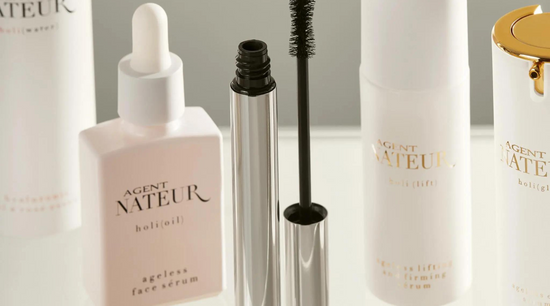

The Importance of Safe Skincare During Pregnancy
When you are pregnant or breastfeeding, you’re suddenly forced to study and question everything you consume or put onto your skin! What you intake, either by means of eating and drinking, or through your skin and consequently into the bloodstream, will eventually make its way to your baby and impact their health and development. It’s common knowledge to avoid certain things while pregnant, like drinking alcohol, even coffee, or staying out of hot tubs. Much the same way, some skin care products are safer than others, and some you need to avoid completely while pregnant or breastfeeding. Unfortunately, many common beauty and skin care products contain potentially harmful ingredients- and many are hiding in plain sight- deep in the long (or short!) list of ingredients. Understanding and avoiding toxic or easily absorbed ingredients is essential, and that’s why we have put together this guide on some essential ingredients to avoid during pregnancy/breastfeeding, and non-toxic ingredients that are safe for use. Please note, it’s important to discuss safe skincare products while you’re pregnant and breastfeeding with your Dermatologist, regardless.
Table of Content
What makes a cosmetic ingredient unsafe for pregnancy and breastfeeding?
The skin, depending on the ingredient in question, absorbs a significant amount of what is applied to it. During pregnancy and breastfeeding, certain chemicals can be transferred through the skin to the fetus or the nursing infant, potentially leading to developmental issues and other health complications.
Ingredients might be considered unsafe due to their ability to disrupt hormones, mimic estrogen, or their link to birth defects and developmental delays in studies conducted on animals. Since the health and safety of children is such a critical issue, we recommend avoiding products with the following ingredients during pregnancy and breastfeeding. Many of these ingredients are safe in other circumstances, which will be clarified next to each relevant ingredient.
15 Unsafe ingredients during pregnancy and breastfeeding
1. Retinoids (Vitamin A derivatives)
High doses of Vitamin A during pregnancy could potentially lead to congenital birth defects. This is because Vitamin A is a crucial part of the development cycle of a fetus, and irregular levels of vitamin A can interfere with regular growth. This is not a problem for adults. In other circumstances, retinoids are among the most common, useful, and studied ingredients in skin care. If retinoids are right for your skin, use them, however if you are pregnant or breastfeeding- you should stop using these products immediately. (1)
2. Hydroquinone
This ingredient is a skin lightener that can absorb deeply into the skin. Hydroquinone is actually almost completely gone from skin care products, since it has been linked to multiple skin conditions and is deemed unsafe for regular commercial use. This ingredient is just generally unsafe for use, but especially if you are pregnant or breastfeeding. (2)
3. Phthalates
This ingredient is used in cosmetics to increase the flexibility and strength of plastics, and linked to endocrine disruption. Studies have found that certain kinds of phthalates are linked to developmental deformities of various kinds, (3)
4. Formaldehyde
Found in some nail polishes and hair dye, it is a known carcinogen. (4) There also exist ingredients known as Formaldehyde releasing preservatives, FRPS. Some common FRPs to know are: DMDM Hydantoin, Imidazolidinyl Urea, Diazolidiynl urea, Quaternium-15, Bronopol, Methenamine, and Sodium Hydroxymethylglycinate. Not enough evidence supports or directly links the use of nail polish to birth defects, developmental issues, or adverse health effects; but caution and informed decision making is advised.
5. Oxybenzone and Avobenzone
Common chemical sunscreen ingredients with some controversy regarding hormone disruption, and potentially harmful to use. Also a known disruptor of marine ecosystems (not a reef-safe ingredient). (5)
6. Parabens
Widely used preservatives that mimic estrogen and can interfere with the development of the fetus. Studies have found that this chemical could be linked to various cancers. Typically, most people are advised to avoid paraben products regardless, but pregnant and breastfeeding women should especially consider the dangers. (6)
7. Fragrances
Often a mixture of chemicals, some of which may be harmful and linked to allergies and other reactions. During pregnancy, allergies are more severe, which on its own is a fair reason to avoid certain essential oils. Otherwise, during breastfeeding, certain harmful compounds in fragrant concoctions can leach into your breastmilk, potentially harming your baby. (7)
8. Salicylic Acid (high doses)
One of the most common ingredients for acne treatments, salicylic acid is most often safe to use. However, when pregnant or breastfeeding, high doses can cause complications similar to taking aspirin. Just as aspirin is not advised in the third trimester due to potential labor and toxicity concerns, salicylic acid should be avoided during pregnancy and breastfeeding. (8)
9. Toluene
Found in nail polishes, it can affect the nervous system. Has also been observed to cross the placental blood barrier, meaning it can be absorbed by a fetus, potentially harming its development. (9)
10. Ammonia
Found in hair colorants, it can cause respiratory issues. Not ideal for vulnerable groups. In addition, ammonia on the skin can lead to significant allergic reactions. (10)
11. Dihydroxyacetone (DHA)
Used in self-tanners, which can be inhaled or absorbed into the skin. Studies have specifically found that this ingredient can interfere with breathing when used in an aerosolized version. (11)
12. Benzoyl Peroxide
High concentrations should be avoided as they can be overly irritating and absorbed by the skin. Additionally, recent controversies have revealed a risk of benzene contamination in improperly stored benzoyl peroxide products. If you are exercising extreme caution, it might be worth avoiding this ingredient. That all said, the FDA considers benzoyl peroxide a low risk ingredient for pregnancies. (12)
13. Essential Oils (certain types)
Some, like rosemary or jasmine, contain easily absorbed compounds that are not ideal during pregnancy. Essential oils are largely unregulated and have little studies surrounding their use or to report adverse health effects- therefore, it can be concluded not enough is known to determine essential oils are proven safe to use during pregnancy and breastfeeding. (13)
14. Methoxyethanol
Shown in studies to cause reproductive toxicity. Should be avoided during pregnancy and breastfeeding. (14).
15. Styrene
Found in plastic products as well as skin care products, this ingredient is known to have toxic properties. This ingredient can also leach into breastmilk, making it less safe for your baby. (15)
15 Safe ingredients during pregnancy and breastfeeding
1. Glycolic Acid
A safe exfoliant that helps to gently remove dead skin cells without harsh effects. This ingredient has very low toxicity and can keep your skin acne-free during pregnancy.
2. Lactic Acid
Another safe exfoliant that also moisturizes and is gentle on sensitive skin. Another hydroxyacid (like glycolic acid) with no health risks for babies.
3. Zinc Oxide
A physical sunscreen that is safe for use as it sits on the skin's surface and is not absorbed.
4. Titanium Dioxide
Similar to zinc oxide, this is used in physical sunscreens and makeup for effective UV protection.
5. Vitamin C
Helps in the production of collagen and is safe for the skin, providing antioxidant protection.
6. Shea Butter
A rich moisturizer that is safe and effective for dry skin.
7. Hyaluronic Acid
Known for its deep hydration properties, it is safe and boosts skin’s moisture content.
8. Ceramides
Help to restore the skin’s barrier and retain moisture without irritating.
9. Glycerin
A gentle hydrator suitable for all skin types, including sensitive skin.
10. Aloe Vera
Known for its soothing and anti-inflammatory properties, perfect for pregnancy-related skin issues.
11. Jojoba Oil
Mimics the skin’s natural oils and provides moisturizing benefits without clogging pores.
12. Calendula
Anti-inflammatory and soothing, ideal for irritation and redness.
13. Sunflower Seed Oil
Rich in nutrients and antioxidants, great for sensitive skin.
14. Argan Oil
Hydrates and softens the skin, rich in vitamin E and essential fatty acids.
15. Avocado Oil
Nourishes the skin and contains vitamins A, D, and E, which are beneficial for skin health and repair.
What Make a Product "Toxic" In Skincare?
The term "toxicity" in skincare refers to the potential of certain ingredients in beauty products to cause harmful effects when absorbed into the body. These effects can be immediate or long-term, affecting not just the skin but also other systems in the body. Toxic ingredients can cause a range of problems from allergic reactions to hormonal disruptions or even cancer. The level of toxicity can depend on the concentration of the ingredient and the duration of exposure, making it crucial for consumers, especially pregnant and breastfeeding mothers, to be well-informed about the contents of their skin care products.
If you’re curious or uncertain about a specific cosmetic product or ingredient, the Environmental Working Group’s (EWG) “Skin Deep” Cosmetic Rating Database is a reliable and well-sourced tool that rates the toxicity of certain ingredients and products, providing breakdowns of known and suspected adverse health effects.
The Challenges of Finding Non-Toxic Skin Care
Finding truly non-toxic skin care can be a hard task due to several challenges:
Lack of Regulation: The beauty industry, particularly in the United States, suffers from a lack of regulation. This means that products can be marketed as "natural" or "non-toxic" without necessarily adhering to standardized criteria.
Misleading Labels: Products might be labeled "organic" or "chemical-free" which are often misleading and not always indicative of safety. Almost anything could be argued to be “a chemical” and “organic” with the right lobbyist.
Complex Ingredients Lists: Many consumers find it difficult to interpret the long and complex lists of ingredients on product labels. Sometimes the truth is hidden in plain sight.
Limited Research: There's limited research on the long-term effects of many new and trending ingredients in the beauty industry. Science is always evolving and new ingredients are found to be unsafe almost every year.
Availability: Products that are genuinely non-toxic may be less readily available or more expensive than their conventional counterparts.
Best Pregnancy and Breastfeeding Safe Cleansers
Best Pregnancy and Breastfeeding Safe Hydrators
Best Pregnancy and Breastfeeding Safe SPF
Conclusion
For pregnant women and breastfeeding mothers, understanding which skin care ingredients are safe and which to avoid is not just about beauty, but about health. With the right information and careful selection, mothers can maintain their skin care routines safely. It's advisable to consult with a healthcare provider before starting or continuing any new skin care product during pregnancy and breastfeeding.
In navigating the vast and often confusing market of skin care, knowledge is your most powerful tool. By choosing wisely and reading labels carefully, mothers can protect not only their own health but also ensure a safe start for their babies. Always remember, when in doubt, opt for simplicity and safety over beauty claims that seem too good to be true.

Related Readings
- Choosing a selection results in a full page refresh.







